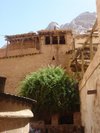
Burning Bushes

The Old Testament reading that provides our sermon text this
Sunday is Exodus 3:1-15. Moses meets God in a burning bush and is called to go
to Pharoah in order to bring the Israelites out of Egypt. In our staff meeting we read this
passage followed by a selection from Belden Lane’s
Landscapes of the Sacred: Geography and
Narrative in American Spirituality. In
the following quote, Lane addresses our unhealthy, often exhausting, spiritual
quest to encounter "the holy."
“In this world come of age in the twentieth
century, half of us have abandoned all hope of awed wonder in the world, while
the other half tried frantically to rediscover a lost magic. ‘We doused the burning bush and cannot
rekindle it; we are lighting matches in vain under every green tree,’ says
Annie Dillard. The effort to see life as
a vivid series of burning bushes—a movement of ever-increasing intensity from
one numinous encounter to the next—is not only spiritually exhausting; it also
misses the profound truth that most often the holy appears in the commonplace
routines and incongruities of human experience.”
By the way, according to one monastic tradition, the burning bush of Ex. 3 (shown here) still grows at St. Catharine’s Monastery on the Sinai Peninsula.
It’s fascinating to ponder, but before planning a pilgrimage, consider these final thoughts from Lane:
“…Christianity
has historically been ambivalent about the benefits of pilgrimage in
the spiritual life. The idea of journeying to an intrinsically sacred
site…to draw from its spiritual energies has been highly suspect.
Gregory of Nyssa, one the great theologians in the apophatic tradition,
roundly denounced pilgrimage. ‘You who fear the Lord,’ he said,
‘should praise him in the places where you now are. Change of place
does not guarantee one’s drawing nearer to God. Wherever you find
yourself, that is where God will come to you.’ Augustine said the same
thing when he insisted that ‘we go to God not by walking, but by
loving.’ These are theologians anxious to emphasize the truth of Psalm
84:5—‘Blessed are they who have highways in their hearts.’ An attitude of pilgrimage, they thought, is far more important than pilgrimage itself.”
If a bush burns but isn’t consumed, will it be hydrated if you water it? Gate we need to know.